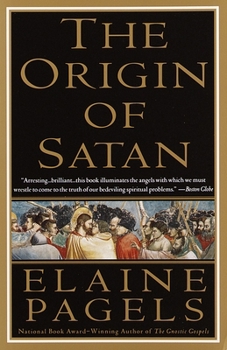The Origin of Satan
Select Format
Select Condition 
Book Overview
From the National Book Award-winning and National Book Critics Circle Award-winning author of The Gnostic Gospels comes a dramatic interpretation of Satan and his role on the Christian tradition. "Arresting...brilliant...this book illuminates the angels with which we must wrestle to come to the truth of our bedeviling spritual problems." --The Boston Globe
With magisterial learning and the elan of a born storyteller, Pagels turns Satan's story into an audacious exploration of Christianity's shadow side, in which the gospel of love gives way to irrational hatreds that continue to haunt Christians and non-Christians alike.
With magisterial learning and the elan of a born storyteller, Pagels turns Satan's story into an audacious exploration of Christianity's shadow side, in which the gospel of love gives way to irrational hatreds that continue to haunt Christians and non-Christians alike.
Format:Paperback
Language:English
ISBN:0679731180
ISBN13:9780679731184
Release Date:April 1996
Publisher:Vintage
Length:240 Pages
Weight:0.61 lbs.
Dimensions:0.7" x 5.2" x 8.1"
Customer Reviews
3 ratings
I Learned a Lot, Just Not What I Was Looking For
Published by Megan S , 1 year ago
The description and title of this book are misleading. The book is not so much concerned with the origins of the character of Satan, so much as it is with the various intra-group disputes that took place amongst Jewish/Roman/Christian communities during the first 200 years of the common era. The origin of "Satan" has more to do with how successive groups of Christians labeled members of their own societies as "enemies" under satanic influences while society shifted and Christianity became increasingly accepted. First, it was the subset of Jews who followed Christ versus the wider Jewish population, then as Christianity became accepted amongst the Romans, it was Christians versus the pagan gentiles, and finally, Christians versus Christians-of-differing-beliefs (aka heretics). Satan as a personality or archetype does not really factor into the book in more than a marginal way, and the book lacked a meaningful discussion of how these ingroup disputes have impacted society to this day. I did learn quite a lot about the Gospels (both canonical and otherwise), but I didn't get what I wanted from the book as a whole.
More like a "social history" of Satan
Published by Thriftbooks.com User , 25 years ago
This is extremely good and informative. Pagels is not out to discuss the origin of the big bad spirit with horns, but the ways in which "religious" people have employed the idea of Satan to characterize their enemies or oppressors. One chapter is called "The Social History of Satan," and I almost think this would have been a better title for the whole book. Pagels also presents fascinating information on the many strains of thought in early Christianity; it made me want to read the recently (50 years ago) recovered "Gospel of Phillip" in particular.
Well written and very informative...
Published by Thriftbooks.com User , 25 years ago
Elaine Pagels is not only a respected researcher in the area of Gnosticism and Early Christian History, but she is also an excellent writer that conveys complex ideas with simplicity and eloquence. She has the ability, unlike many scholars, to explain history with a lively wit and style that helps to keep an average reader's attention while at the same time revealing scholarship and logical thought. This book explains the evolution of Satan as an idea from its beginnings in the Old Testament to the beliefs of Orthodox Christians of the early first millennia and those of the Gnostics. This is a must read for all who wish to learn about Christianity and the origins of one of its main precepts.







